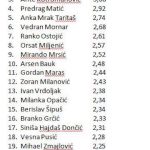There has been a lot of talk about a potential ban on Croatian shops operating on Sundays, generating a divide on the issue with many feeling like closing shop doors on Sundays would only lead to economic decline. Others claim those working in Croatian shops on Sundays should be given more money to do so.
As Poslovni Dnevnik writes on the 25th of February, 2020, instead of a complete ban on Croatian shops doing business on Sundays, 12, 13 or 15 working Sundays are more likely to be introduced throughout the year, Vecernji list writes, stating that the issues of Croatian shops working on Sundays generated more talk than the HDZ Government, led by Prime Minister Andrei Plenkovic, initially thought.
For most of last year, Economy Minister Darko Horvat had been trying to reach a consensus among social partners, and he has also announced the official start of a public debate on the proposal.
As things stand now, however, Croatia would not go as far as introducting a total ban on Croatian shops operating on Sundays, but would allow chain and store owners to designate 12, 14 or 15 Sundays in a year.
In the tourist areas of the country, working Sundays would definitely be those during the summer, while in the continental part of the country, they would be concentrated during the end of the year and possibly during periods of high seasonal sales. In any case, Croatian shops operating on Sundays will more than likely continue to be a hot political topic.
HDZ’s minority partners, the Croatian People’s Party and the Liberal Party are opposed to the bans, the SDP is just about to state its position.
The trade sector employs more than 200,000 people, of whom about 135,000 work in Croatian shops. The potential ban on Sunday operations mostly affects women because they dominate this particular industry. Although the talk of a new regulation on work on Sundays was born from politics, it has in some ways been fueled by employers who are finding it harder and harder to obtain workers.
Make sure to follow our dedicated politics page for much more.









